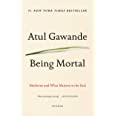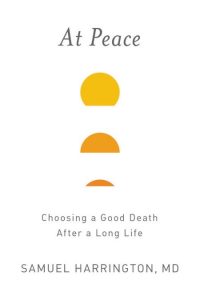The opening line of the internationally bestselling nonfiction book Being Mortal: Medicine and What Matters in the End by writer-physician Atul Gawande reads, “I learned about a lot of things in medical school, but mortality wasn’t one of them.” This sentence, in my view, sets the tone for his whole book. It’s the voice of a person sitting across from you in a pleasant living room, not that of an all-knowing doctor regally situated behind an imposing desk in his office, nor a lecturer talking down from a high lectern.
This approachability must account for the book’s bestsellerdom – it was on the New York Times’ bestseller list for more than eighty-two weeks after its publication in 2014 — despite the fact that its subject matter would be considered by most readers to be grim: aging, physical frailty, and dying. His message, in brief, is: Let’s face it, we’re all mortal; and the medical establishment has failed us in leading us to believe they can “fix” everything. At a certain point we must come to terms with and accept the inevitable, with courage, wisdom and grace.
Here, for example, is some typical straight talk from that man in the living room: “The battle of being mortal is the battle to maintain the integrity of one’s life—to avoid becoming so diminished or dissipated or subjugated that who you are becomes disconnected from who you were or who you want to be. Sickness and old age make the struggle hard enough. The professionals and institutions we turn to should not make it worse” (p. 141).
Almost everyone I know read Gawande’s book when it came out nearly ten years ago, and they remember it appreciatively. His subject, of course, is as perennial as taxes. However, I’ve learned recently, Being Mortal is clearly not the last word on the matter.
Writer-physician Samuel Harrington has written a book that in many ways echoes Gawande’s in its compassionate tone and content, but it also expands on it in down-to-earth, up-to-date, practical ways. At Peace: Choosing a Good Death After a Long Life (Hachette Books, 2018), like Being Mortal, straightforwardly addresses the limits and failures of American medicine, but it goes even further in explaining the hows: How, for example, different diseases lead to common causes of death, and how to recognize a terminal diagnosis.
The last third of At Peace deals with the practical aspects of planning for death — not everyone’s favorite living-room-conversation topic, I know, but one that we’re wise to face head-on, in our own hearts and minds and with our loved-ones. As Harrington states, “Why is advance care planning so important? Because without it you have ceded control of your end-of-life care to medical professionals dedicated to treatment at all cost. Under these circumstances you are likely to undergo futile treatment that is painful and that isolates you from your friends and family.”
Harrington’s important book is about exit strategies. It’s not about making the end of life good; it’s about making it less bad. It’s not about extending life, nor even about extending ‘high quality’ life. It’s about avoiding a painful dying process and futile medical care.
As he clearly states in his Introduction, this book is “not a philosophical treatise about what makes life worth living. It is simply a practical look at declining health, old age, progressive debility, and the practical choices that people can make to minimize the likelihood of the unconsidered death and to maximize the likelihood of a ‘better’ death.”
In sum, this book is about recognizing the limitations of modern medicine in extending life expectancy, the high physical and emotional cost of attempting to extend one’s life in the face of the inevitable, and recognizing when to face death “on your own terms and not someone else’s.”
In my view, At Peace: Choosing a Good Death After a Long Life deserves to be a bestseller too.
~ ~ ~ ~ ~ ~ ~ ~ ~ ~ ~
- At Peace is available on Amazon at: https://www.amazon.com/s?k=at+peace+choosing+a+good+death+after+a+long+life&i=stripbooks&crid=2ONXGOB4UO7F5&sprefix=At+Peace%3A+Choosing+%2Cstripbooks%2C158&ref=nb_sb_ss_fb_1_18
- I had the privilege of meeting author Sam Harrington briefly last month, when he and his wife Debbie Weil were visiting San Miguel de Allende. You can read my WOW interview with Debbie here: blog.bonnieleeblack.com/debbie-weil-on-purpose/ .



Interestingly article…I am not sure i want too read about end of life…i acknowledge that it will come and I will research what i need to at the time.
Yes, I understand, Beth. Trouble is, it’s often difficult to time these things. It’s a good idea to be prepared, as these books explain so well, better than my short review does.
Thank you for the references, Bonnie. I’ll be sure to read them in the near future. I think there should be more discussion on these topics, because I’ve found that people grasp the treatment the doctors offer, in the hope that their life is extended, but their anxiety is usually too high to assess what their quality of life will be, and whether there are alternatives.
Clearly, you see the dilemma, dear Loula: When it’s too late — when we’re near the end, frail, ill, and vulnerable — we might make regrettable decisions (such as agreeing to more painful treatments and tests that only profit the doctors and hospitals). It’s so much wiser to think these things through, with the help of books such as these two, while we’re still clear-minded. Thank you as ever for your thoughtful response.
Nice, Bonnie. Thank you.
Muchísimo gracias, BeDear! I know you — and your wide circle — will appreciate Sam’s book. I hope you’ll get it and read it. — xx
Bonnie,
Although I am slightly biased (!), this is an excellent review and discussion of both Atul and Sam’s books. Thank you so much. And for those who don’t want to read about – or think about – end-of-life, I have bad news for you. It often comes when you’re not expecting it. Better to be prepared and have given it some thought. Xx Debbie
Thank you so much, Debbie. Yes, it’s true, this can’t be emphasized enough: Be prepared! Otherwise we’re hooked up to machines and have no way to escape…
I read Gawande’s book years ago and had the pleasure of hearing him speak at a book event in Boston. He talks about the importance of having these end of life discussions with family and one’s doctor(s). I look forward to reading Harrington’s book. Gracias!
I know you’ll appreciate AT PEACE, too, Suzanne. I think the two books go hand-in-hand.
Hola, la Bonnie! I will look for the book. Not something I would like to think about but, as you said, it’s better to be prepared.
Hola, querida Te! Si, creo que tu y Gary would appreciate both books. — xx
Dear Bon,
I remember when the first book came out and got a lot of press, but I was not prepared for that read at the time. Nine years later I’m more open to it, and the book you recommend seems more appealing.
Love,
Paul
Dear Paul — I know you’ll appreciate the wisdom and guidance both books offer. — BB xx
Dearest Monty — Muchísimo gracias for sharing your dear mom’s end-of-life story. Yes, she certainly knew how to do it! I think you would really appreciate Harrington’s book — both he and Gawande refer to Nuland’s by the way. — BB xx
Dear Bonnie,
Thank you for opening this discussion. I know Gawande’s book, and I look forward to reading (at least the reviews of) Harrington’s. There was also, years ago (1994) Sherwin Nuland’s “How We Die,” which was more clinical – kind of gruesome, actually – but effective in making us think about the end.
My mother, who died in 2017 at age 97, had a good attitude toward her own impending death. I concede upfront that she could afford to have a good attitude, as she had the means to cover all her needs, including a lawyer to set her affairs in order, and the luxury of living in her own home, attended by a loving daughter who lived with her. One of the simple pleasures that defined Mom’s quality of life was her daily quota of two cocktails (rum, the elixir of her Cuban young-womanhood.) My sister said that on our mother’s last visit to her doctor, the young internist told her that she was in good shape, considering her various medical conditions, but he recommended that she eliminate her evening cocktails, or at least cut back to one, as they may compromise the efficacy of her medications – to which my mother (per my sister’s report) responded: “So what? Who cares? I’m 97 years old and I could die tomorrow from any number of causes and I’m ready to go – but tonight I’ll have my cocktails and be happy.” Sure enough, two weeks later she fell down, broke her hip, conked her head, had a mini stroke; went to the hospital, refused surgery, came home, and less than twenty-four hours later went into a coma and died. Her weak rum cocktails had nothing to do with her demise, but they made her final days more comfortable, on her own terms.
Dear Bonnie,
Thank you for another great book recommendation. This one was by far the most important and thought provoking. Empowering is such an over-used word these days, but it so aptly describes how I feel about At Peace. I’ve shared it with several friends and have asked both my adult children to read it in order to better understand future decisions I might need to make.
Thanks again. Best wishes and many years of happiness in your new home!
JoAnne Ecker
How wonderful to hear this! I will happily pass your note along to Sam Harrington, the author. I’m sure he’ll be pleased. Thanks so much for writing and for recommending the book to others. All best wishes to you and your family. — Bonnie